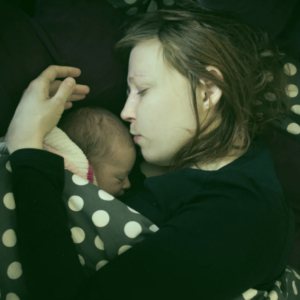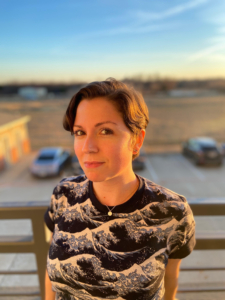“A Quality, Good Life” —Defining Ableism and What It Means to Be Human

It took me ages to graduate with my bachelor’s degree — eight years to be exact. I kept changing my major, I took some time off, and I could only afford to go part-time for a while. All this to say, I had quite a bit of work experience by the time I graduated, so when I saw a job listing for “Marketing Director” at a small nonprofit, I jumped on board. It didn’t really matter to me what I would be marketing for.
Before I became the marketing director of this day habilitation center, my experience with severe disabilities was limited.
Before it became socially unacceptable to use the R-word, my half-sister was diagnosed as “borderline mentally retarded,” with an IQ of 75. We didn’t grow up together, but I got to know her a little when she became an adult. She could communicate well enough and she could hold down a part-time job, so although she had gone to special education classes and never learned to drive, I didn’t consider her “disabled.”
Growing up, I always looked to others in my social group to determine how I should interact with people with cognitive disabilities. Should I just be myself? Should I talk to them like I would talk to a kid? Should I ignore them?
I didn’t want to condescend them or overestimate their ability, but if I’m being really honest, I didn’t want to be too inviting either. I had been bullied in elementary school for having thick glasses, short hair (like a boy’s) and for smelling like smoke. I didn’t want to become an outcast again by being too nice to people with down syndrome or autism. To ease my discomfort, I avoided people with disabilities altogether.
Jump to my first meeting with the executive director of the day hab center: I learned that when people with disabilities “age out of high school” at 21, they often have nowhere else to go. On my first day of work, I learned that the center was not for people with “borderline” disabilities like my sister: Many students at the center needed their diapers changed, couldn’t communicate with words and drooled on trays permanently attached to their wheelchairs. Staff members were required to go to a special self-defense training — so they could protect themselves against students who became violent without hurting them.
It was scary. I said hi to the students when I prepared my lunch in the kitchen, but I spent most of my time hiding in the back office, working on my laptop.
A little over a month into my new job, I reached out to a woman named Tessa, the founder and writer of The One in a Million Baby blog and podcast, so I could interview her for the center’s blog. I had been looking for “mommy bloggers” with a focus on “parenting special needs children” for SEO purposes. I wanted to give them a link on our website, so they could give us a link back, which would boost the center’s site in Google rankings. Everybody wins.
After Tessa accepted my invitation, I thoroughly researched her. I didn’t want to bore her with questions she’d already been asked before. In an interview on her podcast, Tessa said that she wanted her baby, who had a severe disability, to have “a quality, good life.” I could understand that. I was curious about what “a quality, good life” would look like for someone like Tessa’s daughter.
Scrolling through her website, I learned that Tessa’s baby, Eva, had a genetic predisposition that made her deaf, blind and intellectually disabled.
I found out that Eva died at just 10 months old in February 2015.
As I continued scrolling, I discovered an article Tessa wrote for The Mighty called “When a Man Asked Me If My Baby’s Death Felt Like a Relief.”
I read the inciting question, “When your baby died, did you feel relieved?” and held my breath, although I knew the answer from the title, for her response: “No.”
In the article, Tessa justified the value of her daughter’s life to a stranger but explained that her value wasn’t determined by how happy she was or how happy she made anyone else or what she taught other people. We – the able-minded and able-bodied – were not defined by those things. It wasn’t right to try to define a baby with a disability by that standard.
It was hard for me to pinpoint, at first, exactly why tears were welling in my eyes.
Why I had to excuse myself to the bathroom to pull myself together.
Why I sat at my desk for the rest of the day staring at my screen, trying not to cry.
I felt guilty because I had to know the answer too. No, I didn’t ask the question, but I clicked the article because I also wanted to know if she felt relieved. Wouldn’t it feel like a relief, I thought, to know she didn’t have to take care of her daughter for the rest of her life? Wasn’t parenthood supposed to be a limited sentence?
I sometimes thought about what it would be like to be a mom. I wanted to have a baby, but sometimes I got worried. I’d think, “What if there’s something wrong with them?”
Meaning: “What if they have a disability?”
I feared this because I equated having a child with a disability to having a burden.
I grew up well below the poverty line, and I learned quickly that the more you needed help, the more you were seen as a burden. It was one thing to need money, but to need constant attention and support? I could only imagine the strain that would put on your loved ones. People only had so much to give.
In my experience, love was finite. Unconditional love was a myth.
During my undergrad, the major I eventually landed on was Social Science, and my entire degree was based on the question, “What makes us human?” I came to the conclusion, through my studies and my own experience, that we’re different from the other animals because we’re self-actualized. We have a higher sense of awareness.
We adapt to our environment. We progress. We learn from our mistakes, and we get better.
I didn’t realize until I read Tessa’s article that my definition of being human was based on ability level. I had been scared to interact with the students at the center because they didn’t fit my definition of “human.” My definition dehumanized them.
And then I realized that that’s exactly what Ableism is.
That’s how any “-ism” is defined: You exclude a certain group – whether it be based on race, sex, sexual orientation, ability or otherwise – from the majority. You “other” them. You might humor them and be nice to them when you see them, but in your heart, you view them as less.
You view them as something that would need an explanation, a justification. Something that might make you ask a grieving mother, “Did you feel relieved when your baby died?”
Before I started working at the center, I was blind to disabilities — and to my own biases about them. But working there immersed me into a new culture and made hiding from it impossible. The more I learned, the more I realized that one’s ability to learn doesn’t make them more worthy of love.
People don’t have to earn their humanity, and they don’t have to earn love either.
Amanda Woodard is an MFA candidate at Antioch University and a freelance copywriter at mediamanda.com. Her work has been performed in Oral Fixation and published in Ten Spurs, Keep This Bag Away from Children and FlashFlood. When she’s not reading and writing, she enjoys playing board games, rock climbing and practicing yoga.





